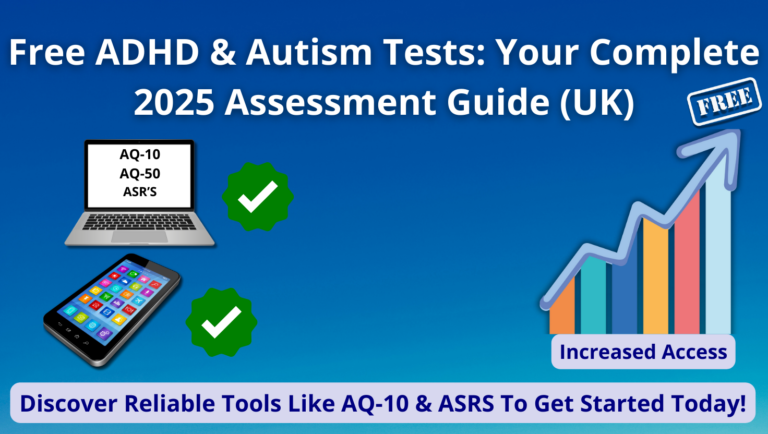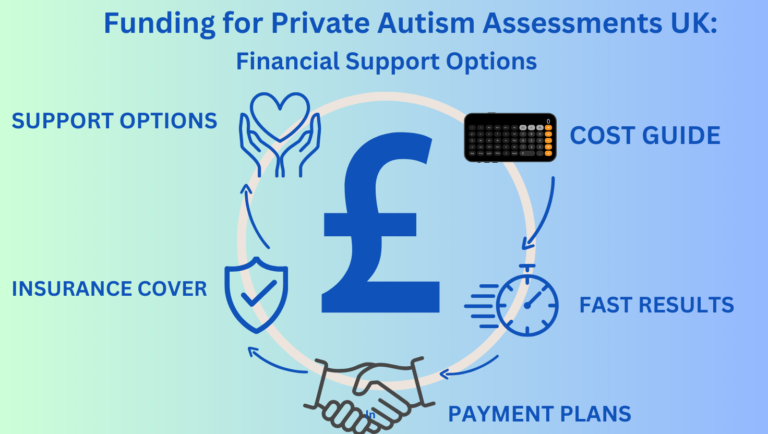CAMHS Autism Assessment Questions: A Complete Guide for Parents (2025)

Key Takeaways
CAMHS autism assessments involve comprehensive questioning about your child’s development, behavior, and daily challenges.
Understanding these questions in advance helps you prepare detailed, accurate responses that lead to better assessment outcomes.
Key areas covered include developmental milestones, social interaction, communication patterns, sensory sensitivities, and daily routines.
While CAMHS waiting lists can extend to 2+ years, alternatives like the Right to Choose scheme can reduce waiting times to around 5.5 months.
Thorough preparation, including keeping a behaviour diary and gathering school reports, significantly improves the assessment process.
Essential Resources:
- NHS Right to Choose for Faster Assessments – Alternative route for quicker autism assessment
- CAMHS Referral Process Guide – Official NHS guidance
- National Autistic Society Assessment Guide – What to expect during assessment
- Autism Diagnostic Tools – Understanding assessment methods
- SIGN Guidelines – Professional diagnostic standards
Introduction:
Understanding CAMHS autism assessment questions can feel overwhelming, especially with current NHS waiting times.
Our comprehensive guide helps you navigate both the questions and assessment process.
As of January 2025, over 200,000 people are waiting for an autism assessment in England,
with 89% waiting beyond the recommended 13-week guideline.
Average waiting times have reached approximately 300 days,
with some regions reporting waits of up to four years.
For example, in Birmingham, the average wait is around 20 months as of late 2024.
While these statistics might feel daunting,
understanding what to expect during the assessment can help you feel more prepared and confident.
Whether you’re just starting this journey or have finally received your assessment date,
this comprehensive guide will walk you through the key questions,
processes and preparation steps for a CAMHS autism assessment in 2025.
Given the lengthy waiting times mentioned earlier,
some families might consider exploring alternative assessment options.
The Right to Choose scheme offers a potential solution for faster access to autism assessments in certain cases.
How to Use the Right to Choose Scheme for Faster Autism Assessments in the UK (2025)
CAMHS Autism Assessment Questions: What Happens During the Process? (2025 Guide)
The CAMHS autism assessment questions begin during the initial referral, whether from your GP or SENCO.
Each stage of questioning helps build a complete picture of your child’s development and needs.
This multi-disciplinary assessment approach helps create a comprehensive evaluation of your child’s needs.
Currently, most services have long waiting times – often several months before your first appointment.
The assessment process can be different depending on where you live.
The expert team may include:
- Consultant psychiatrists
- Psychologists
- Mental health nurses
- Speech therapists
- Occupational therapists
- Paediatrician
- Social workers
- Mental health practitioners
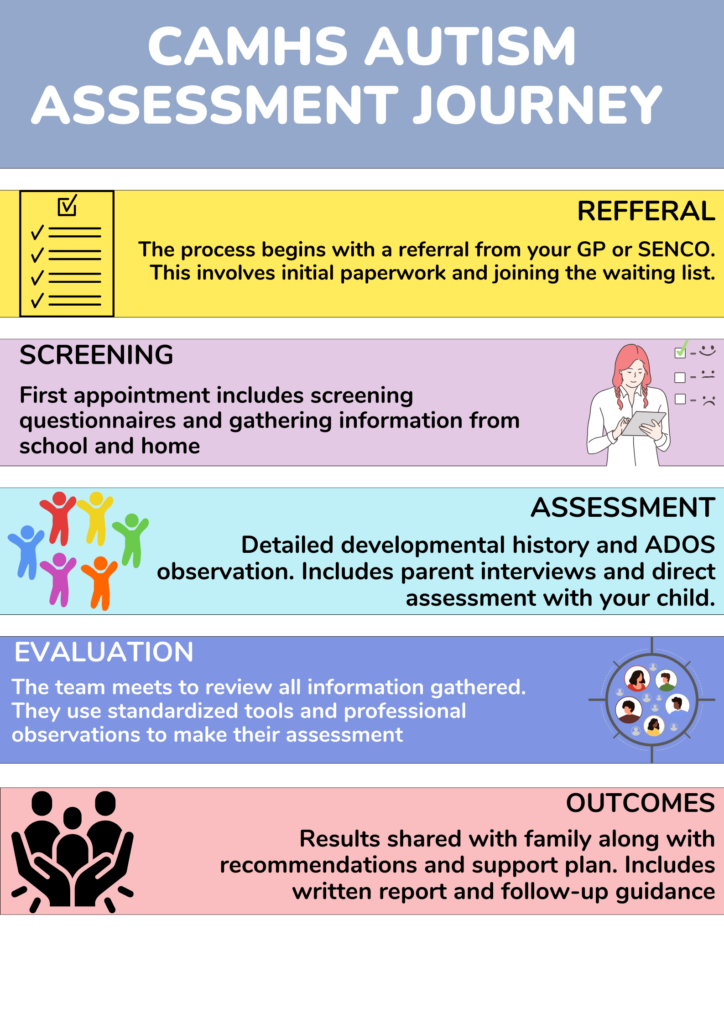
The assessment may happen over 2-3 appointments or multiple sessions.
This depends on your local CAMHS service and your child’s needs.
Stage 1: Initial Screening
- Review of referral information
- Screening questionnaires
- Input from school or college
- Brief first assessment
Stage 2: Developmental History
- Detailed parent interview about early development
- Review of school reports
- Discussion about current behaviour
- Questions about family history of similar conditions
Stage 3: Direct Assessment
- ADOS (Autism Diagnostic Observation Schedule) – a play-based observation
- Cognitive assessments
- Attention tests (e.g., QB test for ADHD assessment)
- Social interaction observations
- Communication checks
Important Notes About CAMHS Autism Assessment Questions:
- Combined autism and ADHD assessment questions may be asked
- Additional assessment questions based on your child’s needs
- Question types vary between different areas
- School-based questions and observations may be needed
After completing all CAMHS autism assessment questions, the team will:
- Review all answers and observations
- Prepare a detailed assessment report
- Share findings with you
- Provide specific recommendations
- Explain next steps in detail
What Questions Will CAMHS Ask About Your Child’s Early Development?
CAMHS autism assessment questions about early development help create a complete picture of your child’s growth.
The team uses specific questions about milestones, behaviours and development patterns from birth onwards.
This comprehensive developmental screening helps identify potential Autism early signs
and tracks how your child has grown from birth until now.
Your answers help create a clear picture of your child’s development pattern.
Pregnancy and Birth Details:
- Problems during pregnancy
- How the birth went
- Birth weight
- Early health issues
- Any special care needed after birth
Early Years (0-3):
- First social smile
- When crawling started
- First steps
- Eating patterns
- Sleep habits
- Any feeding problems
Speaking and Understanding:
CAMHS autism assessment questions about communication include:
- First words used
- Early phrase development
- Methods of requesting
- Following instructions
- Pointing behaviours
- Name response patterns
Social Skills:
- Interest in other children
- Eye contact
- Sharing with others
- Taking turns
- Copying others
- Playing with others
Play and Behaviour:
- How they played with toys
- Repeated movements
- Special interests
- Reactions to change
- Daily routines
Sensory Responses:
- Reactions to sounds
- Response to different textures
- Sensitivity to lights
- Any unusual sensory-seeking
Important:
The team will also ask about a family history of similar conditions.
Don’t worry about remembering exact dates – give your best guess.
Old photos and videos can help you remember these early stages.
What Social Communication Questions Will CAMHS Ask in an Autism Assessment?
CAMHS autism assessment questions focus heavily on social communication patterns.
The team uses standardised questions to evaluate how your child interacts, communicates and responds in social situations.
Non-verbal Communication:
- Response to their name being called
- Eye contact with different people
- Facial expressions and gestures
- Body language
- Ways of showing feelings
- Joint attention (sharing focus)
- Response to others’ signals
Friendship Patterns:
- Making new friends
- Number of friendships
- Play styles (alone or with others)
- Keeping friendships
- Group activities
- Social interaction patterns
- Managing friendship problems
CAMHS autism assessment questions about social understanding cover:
- Interpretation of social cues
- Understanding of humor
- Knowledge of social rules
- Space awareness with others
- Emotional recognition skills
- Reading social hints
- Understanding jokes
- Following unwritten rules
- Personal space awareness
- Recognising others’ feelings
- Seeing others’ viewpoints
- Handling social challenges
Communication Skills:
- Starting communication
- Keeping conversations going
- Taking turns when talking
- Changing talk style for different people
- Understanding common phrases
- Using language in social settings
- Interest in others’ conversations
School Social Life:
- Following classroom routines
- Playground behaviour
- Group work participation
- Lunchtime social habits
- Class participation
- After-school activities
- Teacher and peer relationships
Sensory Responses:
- Managing noisy settings
- Comfort in crowds
- Unusual sensory interests
- Response to different textures
- Light sensitivity
- Impact on Social Situations
Important:
The CAMHS assessment needs examples from different settings.
Your child may act differently at home, school or in public.
Real examples help create an accurate picture.
Remember:
Share honest examples of your child’s usual behaviour.
The autism assessment aims to understand their natural communication style.
What Behavioural and Sensory Questions Will CAMHS Ask During an Autism Assessment?
The behavioral section of CAMHS autism assessment questions examines patterns using tools like ADOS.
These questions explore routines, sensory responses and daily behaviours
through standardised evaluations
and includes a detailed sensory processing evaluation to understand your child’s responses.
ADOS is a standardised assessment that helps observe your child’s natural behaviours.
The team combines these observations with questions about your child’s daily life.
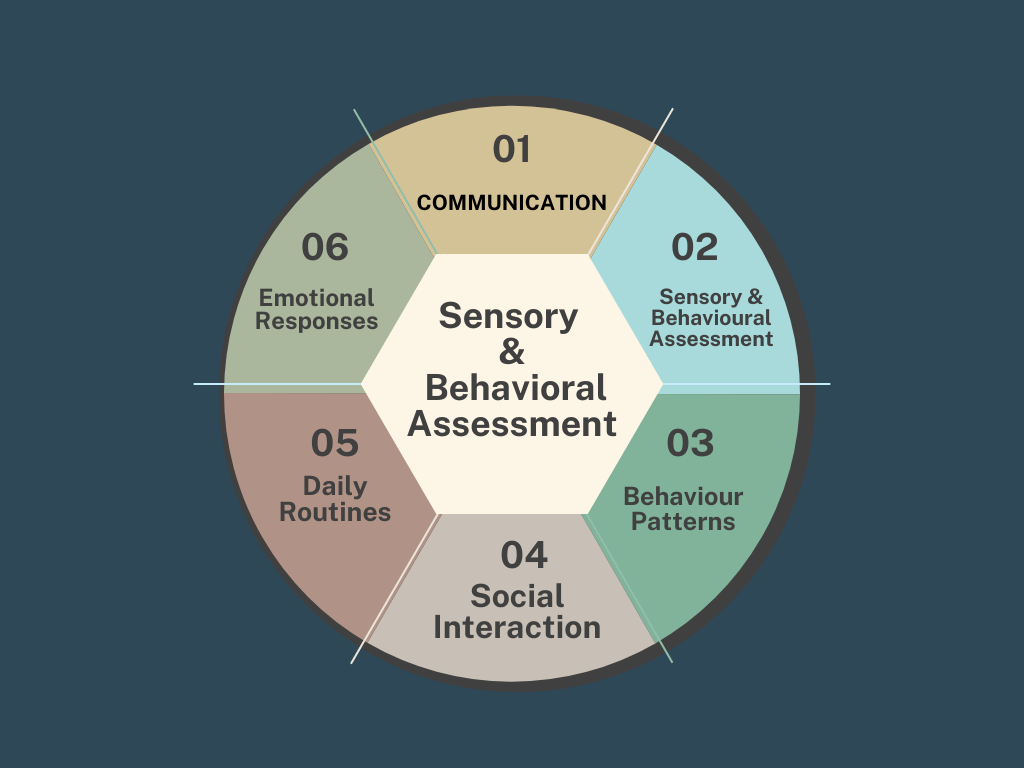
Key CAMHS autism assessment questions about daily routines cover:
- Regular patterns and routines
- Responses to change
- Need for consistency
- Impact on family life
- Adaptation abilities
Special Interests Assessment:
- Topics of intense focus
- Time spent on interests
- Ability to switch tasks
- Age-appropriate interests
- Sharing interests
- Knowledge depth
- Impact on daily activities
Sensory Processing Evaluation:
- Sound sensitivity testing
- Light sensitivity checks
- Touch response patterns
- Food texture preferences
- Temperature Awareness
- Pain responses
The CAMHS autism assessment questions about sensory experiences explore:
- Reactions to sensory input (noises, lights)
- Texture preferences and avoidances
- Specific comfort or distress triggers
- Impact on daily routines and social interactions
- Sensory seeking behaviours
- Environmental adaptations needed
- Coping strategies used
Being prepared to answer these questions with specific examples
can provide valuable insights to the assessment team.
For instance, you might describe how your child covers their ears in noisy environments
or seeks deep pressure through tight hugs.
Understanding your child’s sensory profile
Can also help you advocate for appropriate accommodations and support strategies,
both during and after the assessment process.
For more detailed information on sensory processing in autism, you can visit the STAR Institute’s website: https://www.spdstar.org/basic/understanding-sensory-processing-disorder].
Change and Transition Assessment:
- Managing transitions
- Anxiety during changes
- Visual schedule use
- New situation responses
- Preparation needs
- Unexpected event handling
- Coping strategies
Physical and Motor Assessment:
- Coordination checks
- Fine motor skills
- Handwriting abilities
- Daily task skills
- Movement patterns
- Body posture
- Physical boundaries
Executive Function Evaluation:
- Planning abilities
- Attention patterns
- Task initiation
- Activity completion
- Organisation skills
- Instruction following
- Time management
CAMHS autism assessment questions will explore executive functioning through specific examples.
These questions help understand how your child:
- Plans and organises tasks
- Maintains attention
- Manages complex information
- Completes daily activities
Executive functioning includes skills such as:
- Organising information and materials
- Planning and prioritising tasks
- Paying attention and maintaining focus
- Inhibiting inappropriate responses
- Processing and managing complex information
Many children with autism may have difficulties with executive functioning.
When answering assessment questions, provide specific examples of how these skills impact your child’s daily life.
For instance, you might describe:
- How your child organises their school materials
- Their ability to plan and complete homework assignments
- How they manage their attention in different settings
- Their approach to complex tasks or multi-step instructions
For more detailed information on executive functioning in autism, visit the Autism Speaks resource page: https://www.autismspeaks.org/executive-functioning
CAMHS Autism Assessment Questions about Emotional Regulation explore:
- How emotions are recognised
- Ways feelings are expressed
- Managing frustration and stress
- Emotional responses to sensory input
- Support strategies needed
Important:
CAMHS autism assessment questions combine several approaches:
- Direct observations using ADOS
- Parent/carer detailed responses
- Professional observations
- Environmental assessments
- This comprehensive approach helps understand your child’s patterns across all settings.
Remember:
The autism assessment process uses standardised tools but is still tailored to your child’s individual needs.
Share specific examples of their typical behaviours and responses.
What School and Daily Life Questions Will CAMHS Ask During an Autism Assessment?
CAMHS autism assessment questions about school and daily life cover multiple areas.
From classroom behaviours to daily routines.
These questions help understand how your child manages in different environments and situations to understand your child’s educational needs and routines.
Using tools like the Autism Diagnostic Observation Schedule (ADOS),
the team reviews reports and teacher’s questionnaires and may observe your child at school.
This comprehensive approach helps create a complete picture for the autism assessment.
Academic Assessment:
- Learning preferences and styles
- Strong and challenging subjects
- Reading and writing skills
- Math abilities
- Test-taking patterns
- Homework habits
- Meeting curriculum goals
- Class participation
- Cognitive skills
- Academic progress
School Behaviour:
- Following classroom rules
- Joining in lessons
- Working in groups
- Attention and focus
- Organising materials
- Completing tasks
- Teacher relationships
- Managing changes
Independence Skills:
- Morning preparation
- School readiness
- Managing belongings
- Using visual supports
- Homework organisation
- Self-care tasks
- After-school routines
- Basic life skills
- Time management
- Task completion
CAMHS autism assessment questions about school support investigate:
- Current support systems
- Additional help needed
- Educational goals and progress
- Successful learning strategies
- Resource effectiveness
Social Communication:
CAMHS autism assessment questions about school social communication cover:
- Friendship development
- Playground interactions
- Break time behaviour
- Group participation
- Social engagement patterns
Sensory Experiences:
- Noise reactions
- Light sensitivity
- Material preferences
- Managing busy spaces
- Break requirements
- Environmental needs
- Sensory seeking
- Sensory avoidance
Important:
The CAMHS assessment team looks at information from multiple sources to understand your child’s daily experience.
They use standardised tools and observations to assess against established autism criteria (DSM-5 or ICD-11).
Remember:
When answering CAMHS autism assessment questions:
- Share both challenges and achievements
- Give specific examples
- Include different settings
Describe support needs clearly Your detailed answers help develop appropriate support plans.
What Emotional Understanding Questions Will CAMHS Ask During an Autism Assessment?
CAMHS autism assessment questions explore emotional understanding through specialised tools.
These questions examine how your child recognises, expresses and manages emotions in various situations.
Like the Reading the Mind in the Eyes Test
and anxiety assessment measures
like RCADS (Revised Children’s Anxiety and Depression Scale)
evaluate your child’s emotional responses.
This helps create a complete picture of your child’s emotional processing.
Understanding Emotions:
- Recognising feelings
- Naming emotions
- Reading others’ emotions
- Understanding facial expressions
- Body language awareness
- Voice tone recognition
- Expressing feelings
- Sharing experiences
- Identifying and describing emotions (alexithymia assessment)
Anxiety and Stress:
- Worry triggers
- Physical stress signs
- Anxiety patterns
- Stress responses
- Overwhelming situations
- Calming strategies
- Warning signs
- Daily life impact
- Sensory-related anxiety
- Environmental triggers
The CAMHS autism assessment questions explore coping strategies through:
- Calming techniques used
- Emotional management methods
- Self-soothing preferences
- Support needs identification
Emotional Regulation:
- Home emotion management
- School emotional control
- Social situation responses
- Change reaction patterns
- Meltdown handling
- Recovery methods
- Support requirements
- Environmental impacts
Important:
The CAMHS assessment looks at emotional understanding across different settings.
The team uses standardised tools to evaluate how your child recognises and responds to emotions in various situations.
While up to 80% of autistic young people may experience significant anxiety,
this isn’t a requirement for an autism diagnosis.
Remember:
Provide examples of challenges and successful strategies.
Your insights help the team understand your child’s emotional needs and develop appropriate support plans, regardless of the assessment outcome.
What Can You Do While Waiting for Your CAMHS Autism Assessment?
While waiting for your CAMHS autism assessment, prepare for the questions you’ll be asked.
Use this time to gather information, document behaviours and access support services that will help you answer assessment questions comprehensively and interim support strategies.
For additional guidance on preparing documentation and understanding autism assessment processes, visit the Autism Research Centre’s parent resources page
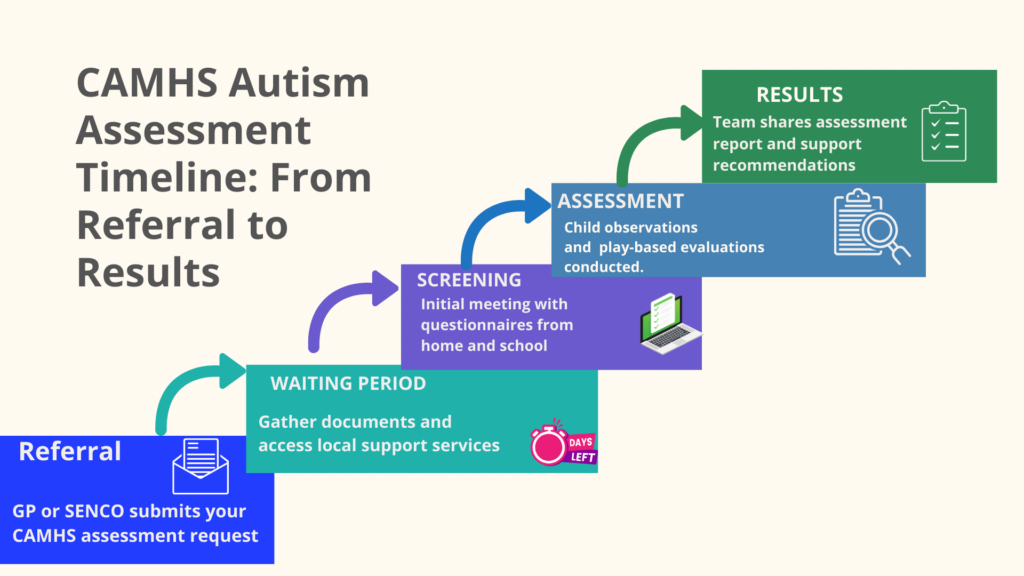
Current Waiting Times:
- Most wait beyond the 13-week guideline
- Specific waiting times and regional variations may fluctuate, so always confirm the most current information with your local CAMHS service
- Regional variations exist (Birmingham: 20 months)
- Priority assessment systems
- Right to Choose option (limited capacity)
- Alternative provider possibilities
- Regular status tracking is needed
Gather These Documents:
- GP or SENCO referral information
- School reports and observations
- Developmental timeline
- Behaviour diary examples
- Previous assessments
- Medical history
- ADOS preparation notes
Access Available Support:
- National Autistic Society resources
- Local council services
- Forward Thinking Birmingham Crisis line
- Speech therapy options
- Educational psychology help
- Parent support groups
- Online resources
- School support
- Local autism services
For comprehensive guidance on navigating autism support services and preparing for assessments, visit the NHS Autism Information Page: https://www.nhs.uk/conditions/autism/
Prepare for CAMHS Autism assessment questions by:
- Completing initial questionnaires
- Understanding assessment types
- Attending preparation sessions
- Gathering specific examples
- Recording daily observations
Keep Track of Progress:
- Check referral status regularly
- Maintain CAMHS communication
- Know your rights
- Understand complaint procedures
- Report urgent concerns
- Research alternatives
- Build support network
Important:
While waiting times exceed guidelines, use this time to prepare.
The Right to Choose option exists but has limited availability.
Keep detailed records to help the assessment team.
Remember:
Focus on gathering specific information needed for tools like ADOS.
Understanding what assessors need helps you prepare effectively during the wait.
What Does the CAMHS Assessment Timeline Look Like?
The CAMHS autism assessment questions are asked across several appointments.
Understanding this timeline helps you prepare for each set of questions and what to expect at each stage and what to expect when your assessment begins
Length of Appointments:
CAMHS autism assessment questions are asked across several appointments:
- Parent interview (1.5-2 hours)
- ADOS observation (60 minutes)
- School assessment (full session)
- Additional evaluations (45-60 minutes each)
- Results discussion (1.5 hours)
After completing all CAMHS Autism assessment questions, expect:
- Team review meeting
- Written report (4-6 weeks)
- Detailed feedback session
- Support recommendations
- Next steps planning
Additional Steps:
- School reports collection: 2-3 weeks
- Specialist assessments if needed: 2-4 weeks
- ADHD assessment if required: 1-2 extra appointments
- Additional observations if needed
Timeline Factors:
- Type of assessments needed
- School information gathering
- Professional availability
- Additional needs identified
- Report writing period
Important:
Once appointments start, the complete process typically takes 2-3 months.
This varies between CAMHS services and depends on your child’s specific needs.
Remember:
These timelines begin after the initial waiting period.
During the assessment process, each appointment builds a comprehensive picture of your child’s needs.
How to Prepare for Your CAMHS Assessment?
Prepare for CAMHS autism assessment questions by understanding what information you’ll need.
Our comprehensive checklist helps you gather documents and examples that answer common assessment questions.
Documentation to Gather:
Prepare these documents to help answer CAMHS autism assessment questions:
- Completed CAMHS questionnaires
- GP or SENCO referral letters
- Evidence of social communication
- Records of behaviours
- School reports
- Medical history
- Previous assessments
- Communication examples
- Developmental timeline
- Sensory response notes
Behaviour Diary Tips:
Keep a behaviour diary to help answer CAMHS autism assessment questions about:
- Daily routines
- Social interactions
- Repetitive behaviors
- Sensory responses
- Eating patterns
- Sleep habits
- Successful strategies
- Communication styles
- Play patterns
- Environmental reactions
Help your child understand CAMHS autism assessment questions by explaining:
- How feelings are recognised
- Ways emotions are named
- Understanding of others’ feelings
- Response to expressions
- Emotional communication methods
Assessment Day Preparation:
Prepare for your CAMHS autism assessment questions by:
- Reviewing all documentation needed
- Understanding each type of assessment
- Planning for comfort and breaks
- Bringing support materials
- Having examples ready to share
Important:
The team may observe your child in different settings, including school visits.
Each appointment serves a specific purpose in building a complete understanding of your child’s needs.
Remember:
While waiting times often exceed 13 weeks, use this time to access support groups, attend parent workshops and join pre-assessment information sessions.
These resources help you prepare effectively.
Frequently Asked Questions About CAMHS Autism Assessment
Q: What is the NHS Autism Screening Questionnaire?
Common CAMHS autism assessment questions start with initial screening tools like M-CHAT and AQ-10.
These help determine if a full assessment is needed and what questions will be asked during the process.
Your GP or healthcare provider may use these to help decide if a full CAMHS assessment is needed.
Q: What are the different levels of autism?
The DSM-5 defines three support levels of autism:
- Level 1: Requiring support
- Level 2: Requiring substantial support
- Level 3: Requiring very substantial support
Each level relates to how much support a person needs with social communication and repetitive behaviours.
Q: What scores indicate autism risk?
Screening tools have different scoring systems. For example, on the AQ-10, a score of 6 or above suggests a referral for full assessment may be helpful.
However, no single score can diagnose autism – this requires a complete professional assessment.
Q: Can children with autism participate in assessments?
Yes, CAMHS autism assessment questions are adapted for each child’s abilities. The assessment team:
- Makes accommodations as needed
- Uses play-based questions
- Adjusts communication methods
- Modifies assessment activities
- Provides sensory breaks
Parents can help prepare their child by explaining what will happen and bringing familiar items for comfort.
Q: What autism checklists are used by CAMHS?
CAMHS professionals use several standardized tools including:
- ADOS-2 (Autism Diagnostic Observation Schedule)
- ADI-R (Autism Diagnostic Interview-Revised)
- CARS-2 (Childhood Autism Rating Scale)
These are used alongside clinical observations and parent/teacher reports.
Q: How long after an assessment do you get results?
Typically, you’ll receive a written report within 4-6 weeks after the final assessment.
This includes detailed findings and recommendations.
A feedback meeting is usually arranged to discuss the results and next steps.
Important: Remember that these tools and assessments are part of a comprehensive evaluation process. No single test or checklist can diagnose autism.
Conclusion:
Understanding CAMHS autism assessment questions is key to navigating the diagnosis journey.
While the process requires patience,
being prepared for assessment questions helps you advocate effectively for your child’s needs.
Understanding the assessment pathway and support while waiting helps families manage the current system challenges.
While waiting times vary significantly across regions
from 300 days to several years
you can use this time to prepare thoroughly and gather relevant information.
Remember,
Every piece of documentation and observation you collect helps build a clearer picture for the assessment team.
Stay proactive in seeking support while waiting, and don’t hesitate to contact local support groups or your GP for guidance.
The journey might be longer than expected,
but understanding the assessment questions and process puts you in a stronger position to advocate for your child’s needs.
About the Authors: Dwayne and Charlene are committed to providing accessible and reliable information to families with special needs. Charlene’s extensive experience working with children of all abilities as a professional childminder combines with Dwayne’s personal journey as a father to their son with autism to provide families with a deep understanding of the issues families face. Together, they offer practical guidance and support.


